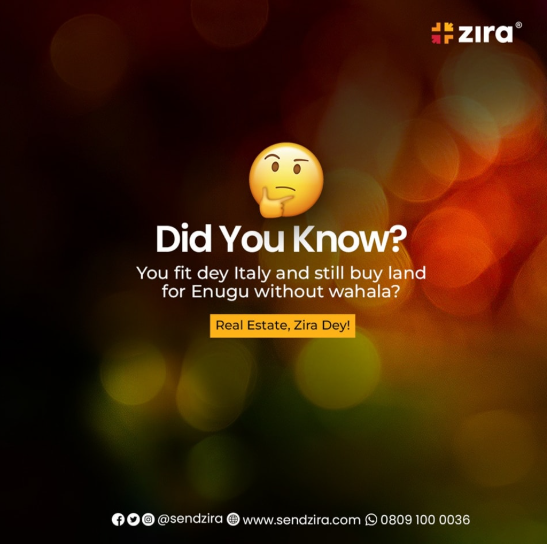Avoiding Property Scams in Nigeria: Red Flags Every Diaspora Investor Should Know

Dreaming of owning property back home? You’re not alone. Many Nigerians abroad want to invest in real estate, but the fear of being scammed often holds them back. Unfortunately, Property scams in Nigeria are real, and diaspora investors are often targeted because they can’t be physically present to verify everything.
The good news? With the right knowledge, you can protect yourself and make smart property investments. Before we dive into the warning signs, let me introduce you to SendZira – we specialize in helping Nigerians abroad navigate complex tasks back home, including real estate assistance with trusted local experts who protect your interests.
Let’s explore how to avoid property scams and invest safely in Nigerian real estate

Understanding Types of Real Estate Frauds in Nigeria
Property scams come in many forms, but knowing the common types helps you stay alert:
Land Grabbing Scams: Fraudsters sell land they don’t own, often targeting multiple buyers for the same plot.
Fake Document Scams: Scammers create convincing but fake ownership papers and certificates.
Property Flipping Fraud: This is when scammers quickly buy and sell properties using false information to inflate prices artificially. They often target eager buyers who don’t do proper research.
Online Property Scams: How to avoid property scam in Nigeria online? Be extra careful with properties advertised only online, especially at unusually low prices.
Double Allocation: Government or traditional authorities mistakenly or deliberately allocate the same land to multiple people.
Key Documents Required for Land Purchase in Nigeria
Before buying any property, you must understand the documents required for land purchase in Nigeria. Missing or fake documents are the biggest red flags:
Essential Documents:
Certificate of Occupancy (C of O)
Deed of Assignment
Survey Plan
Tax Clearance Certificate
Building Approval (if there’s a structure)
Receipt of Purchase
Additional Documents to Request:
Family Receipt (for family land)
Customary Right of Occupancy
Governor’s Consent (for statutory rights)
Power of Attorney (if seller is represented)
How to Spot a Fake Land Document in Nigeria
Fake documents are getting more sophisticated, but you can still spot them:
Red Flags in Documents:
Poor quality printing or paper
Spelling errors and grammatical mistakes
Missing official stamps or seals
Inconsistent information across documents
Suspiciously low file numbers
Documents that look too new for claimed dates
Verification Steps:
Cross-check document numbers with relevant government offices
Verify stamps and seals with issuing authorities
Compare signatures across multiple documents
Check if the survey plan matches the physical location
Things to Know Before Buying Land in Nigeria
Smart preparation prevents most scams. Here’s what every diaspora investor should know:
Research the Location:
Visit Google Maps to verify the area exists
Check if the location matches the address on documents
Research the neighborhood’s development plans
Confirm access roads and basic infrastructure
Understand Land Laws:
Each state has different land laws and requirements
Some areas restrict foreign ownership
Traditional vs. statutory rights affect ownership
Governor’s consent may be required for transfers
Budget for Additional Costs:
Survey fees
Legal fees for verification
Documentation costs
Development levies
Potential government consent fees
How Can I Protect Myself from Being Scammed?
Protection starts with smart practices and the right support system:
Essential Protection Steps:
Never Pay Full Amount Upfront: Legitimate sellers accept installment payments
Use Trusted Legal Representatives: Don’t rely on the seller’s lawyer only
Physically Inspect the Land: Either visit yourself or send a trusted representative
Verify Everything Independently: Don’t take anyone’s word for granted
Research the Seller: Check their reputation and previous transactions
Get Multiple Opinions: Consult different lawyers and surveyors
What is the Best Way to Avoid Being Scammed?
The best protection is having reliable local support. This is where SendZira’s real estate assistance becomes invaluable. We connect you with verified, trustworthy professionals who protect your interests.
Warning Signs of Property Scams
Trust your instincts when you notice these red flags:
Seller Red Flags:
Pressure to buy immediately
Reluctance to show original documents
Asking for payment in cash only
No fixed office address
Poor communication or evasive answers
Significantly below-market pricing
Property Red Flags:
No physical access to the land
Conflicting boundary descriptions
Missing infrastructure in supposedly developed areas
Local community disputes about ownership
Multiple people claiming ownership
How to Verify Property Ownership Legitimately
Step-by-Step Verification Process:
Document Authentication: Take all documents to relevant government offices for verification
Physical Survey: Hire an independent surveyor to confirm boundaries
Community Check: Speak with neighbors and local chiefs about the land
Legal Search: Have a lawyer conduct a proper title search
Government Confirmation: Verify with state land registry and local government
Banking Check: Ensure all payments go through proper banking channels
Online Property Investment Safety
How to avoid property scam in Nigeria online requires extra caution:
Online Safety Rules:
Never send money based on online listings alone
Video call with sellers to verify legitimacy
Request multiple photos and videos of the property
Use secure payment methods with proper documentation
Research the website or platform’s reputation
Meet sellers virtually before any financial commitment
Working with Trusted Professionals
Building Your Support Team:
Licensed real estate lawyers
Certified surveyors
Registered estate agents
Banking partners for secure transactions
Local representatives you can trust
Questions to Ask Professionals:
Are you licensed and registered?
Can you provide references from other diaspora clients?
What’s your verification process?
How do you handle disputes?
What are your complete fees upfront?
Red Flags in Communication
Warning Signs in Interactions:
Sellers who avoid phone calls
Refusal to provide additional documentation
Changing stories about property history
Unwillingness to allow independent verification
High-pressure sales tactics
Promises that seem too good to be true
Taking Action When You Suspect a Scam
If something feels wrong:
Stop all payments immediately
Document all communications and transactions
Contact local authorities if money was already sent
Seek legal advice quickly
Report to relevant government agencies
Warn other potential victims in diaspora communities
Making Safe Property Investments
Property investment in Nigeria can be profitable and safe when you:
Take time to research thoroughly
Work with trusted local professionals
Verify everything independently
Follow legal processes completely
Maintain realistic expectations
Build relationships with reliable contacts
Your Partner in Safe Property Investment
Investing in Nigerian property from abroad doesn’t have to be scary. With proper knowledge, trusted professionals, and reliable support systems, you can make smart investments safely.
SendZira specializes in connecting diaspora Nigerians with verified real estate professionals who understand your unique challenges. We help you navigate the complex property market while protecting your interests every step of the way.
Don’t let fear of scams prevent you from achieving your property investment dreams. With the right guidance and support, you can safely invest in Nigerian real estate and build the future you’ve been planning.
Ready to start your safe property investment journey? Connect with trusted professionals who put your interests first.
